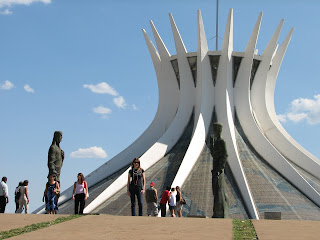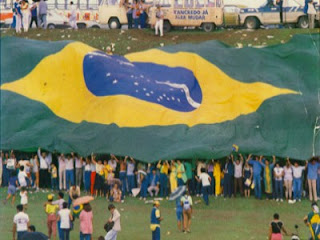
Saturday, April 25, 2009
Manos de Pincel
This is a beautiful animation video I found on You Tube. It´s from Alternativas Acadêmicas, in Chile. It reminded me of myself, many years ago.
Friday, April 24, 2009
Buildings Speak to Us

No, no, I´m not talking about haunted houses. I´m referring to what author Alain de Botton says in his book The architecture of happiness. According to him, there is a language buildings and objects speak when we look at them, and our fondness or distaste of them comes from the relationship we establish between those buildings and human beings whom we like or do not like. In other words, they remind us of people we´ve encountered in our life.
That happened to me when I visited Brasília, the capital of Brazil, for the first time. I was very excited I was going to see the buildings I knew housed the big decisions in this country.The Congress, the Senate, the Alvorada palace. I was going to actually be there and experience the work of architect Oscar Niemeyer, the man who designed that city, built in the 1960´s, during the government of President Juscelino Kubitschek.I was finally going to have a glimpse of what these two men thought Brazil should look and be like.
I was very disappointed when I got there. As I tried to connect with the buildings, they didn´t even try to connect with me. They were mute. Concrete giants enclosed within themselves.
That´s when I began realizing what de Botton says. Those buildings, and Brasília as a whole, for the landscape is uniform, reminded me of what I find most obnoxious in certain people, especially when they are powerful: selfishness, lack of empathy and that attitute of owning the world. In a paradox, I felt suffocated in a place where empty spaces are abundant. There are no sidewalks, there are almost no trees ( in a country full of trees), the air is dry to the point of gasping. The only positive aspect of Brasília, for me, is the people: kind, friendly, warm. And that takes me to another realization about my country.
For many decades now, Brazil has been trying to be modern, developed, respected. And in some ways we´re reaching that. But the concept of modern in the minds of our past leaders (and some present ones, too) was linked to the idea of rupturing with the past at any cost. For the country of the future, anything that resembled our colonial past had to go.Wood, brick, clay, intricate shapes, bright colors either resembled Europe, or the jungle, or the slave quarters. In the anxiety of finding a face in the mirror that could match the idea of new, they chose concrete. Cold, mute concrete. Had they looked more closely, they´d have seen that´s not the Brazilian face. The Brazilian face is every face. And that´s where novelty is: in diversity. Instead of wasting time and money trying to build huge concrete structures to show up to the world, they should have tried to build a fair society first.
Democracy

Twenty-five years ago, in April, I was able to be part of one of the most beautiful and memorable moments in History for my country: the campaign for the end of the military dictatorship and the call for direct elections for the presidency. The rallies in the cities had started in January, after the previous year had had an annual inflation rate of 240%. Can you imagine what that is like? Working hard and finding out that your money simply "disappeared"; that it´s not worth anything? That you won´t be able to save a cent: right the opposite, your debts only get higher?
The military dictatorship, as with any dictatorship anywhere, nearly destroyed this country. They couldn´t destroy its people, though. Despite years and years of torture, persecution, concealing of information, archaic trade regulations, hypocritical nationalism, and stupidity, all maintained through the use of violence and repression,one day people thought they had had enough. The press could not take it any longer, either, and the opposition party (the only one) was much better organized, as it had never been before. It was the time to get our country back.
I was fourteen years old, and had to wear a uniform to go to school. The only item I could customize to my taste was my backpack, and boy, was it full of pins and buttons: "Direct elections, now!"/"Stop repression"/"I want my country back!" During Social Studies, in between the reciting of historical dates and names of national heroes, I asked our teacher: what is the meaning of democracy? Could we discuss that? I liked her a lot, she had honest eyes. I remember she said something like: that one day I´ll be able to answer your question and not be afraid of doing so.
For us, Brazilians, at that time, that was what it was all about: militaries out=presidential elections=democracy=the possibility of breathing. We wanted to breathe. We wanted to pick up the pieces and build a country again, where we could be citizens, and not hostages.
The seed was planted but there were some set backs. It was not until 1989 that we could elect a president. And when he proved to be corrupt and reckless, we impeached him. We wanted better.
It takes a long way to rebuild a country. But it´s happening. Day by day.
This image will never, ever be erased from my memory. During a march in Brasilia, there was heavy rain, and people ran to protect themselves under the giant Brazilian flag they were carrying.